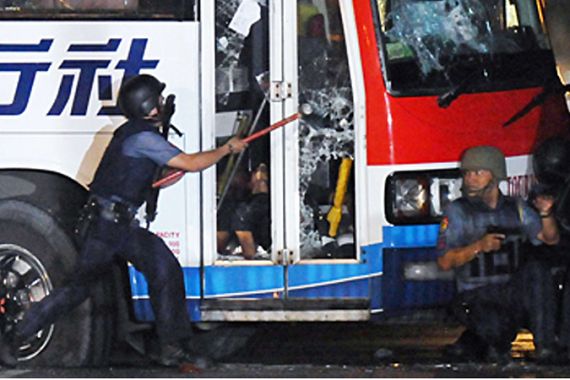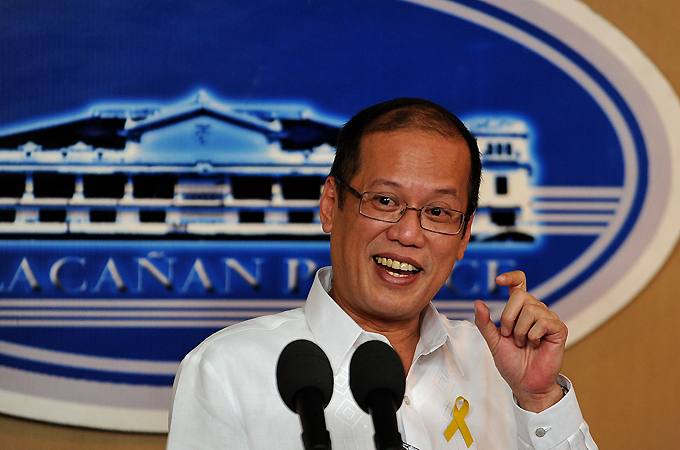Manila officials spared over siege
Philippine president says officials will not face criminal charges over a hostage crisis that left eight people dead.

 |
| Aquino announces that formal charges will be laid against four police officers, but no high officials [AFP] |
Benigno Aquino III, the president of the Philippines, has spared senior officials involved in the bungled hostage rescue operation from criminal liability.
Four police officials, however, will face legal charges over the hostage operation on August 23 that left eight Hong Kong tourists dead.
Aquino recommended on Monday that officials from the city of Manila should instead face administrative sanctions.
The president said that he was backing such proceedings against Rodolfo Magtibay, the Manila police chief, Leocadio Santiago, the police director, and Alfredo Lim, mayor of Manila. The vice-mayor and two senior police operatives are also to be included in the proceedings.
“The message has to be sent … when you accept the perks and privileges of the office, the duties and responsibilities are equally accepted by you. You are responsible for your failure,” Acquino said, referring to the police officers.
“I pledged from the very start that there would be accountability.”
Media spared
The media, including two radio broadcasters who were accused of having worsened the crisis by interviewing the hostage-taker, were spared.
| In Depth | |||||||||||||
|
Aquino said the the broadcasters displayed behaviour that was “irresponsible, bordering on the criminal”, but he said his government did not want to limit the freedom of the press.
The government has adopted most of the recommendations of a fact-finding committee that was led by the justice secretary. In particular, Aquino announced that the government is taking steps to improve the capability of security forces.
The hostage fiasco, in which a disgraced policeman took over a tourist bus, soured Philippines’ relations with Hong Kong and Beijing, presenting a challenge for the president in his first months in office.
Meanwhile, the highest court in the Philippines on Friday unanimously upheld a controversial anti-terrorism law.
The legislation was passed in 2007 as part of the US-led ‘war on terror’, and was justified as part of the campaign against fighters linked to al-Qaeda operating in the country. Yet its critics argue that its definition of “terrorism” is too broad and could be used to muzzle civil liberties.
Several left-wing groups, legislators and human rights advocates have made six separate petitions to the supreme court to declare the law unconstitutional.
Left-wing alliance Bayan, one of the groups that sought the repeal of the Human Security Act, said Monday it would appeal last Friday’s ruling.
The law was passed by Gloria Macapagal Arroyo, the country’s former president and a staunch US ally, amid fears that the country was becoming a training ground for Islamic fighters.
‘Insecurity act’
Critics of the Arroyo administration have branded the law as the “inhuman and insecurity act” because it allows for warrantless arrests and for “terror” suspects to be detained without charges, the Philippine Daily Inquirer reported on Monday.
The court found, however, that the petitioners could not prove that the law has done them any actual damage.
“Allegations of abuse must be anchored on real events before courts may step in to settle actual controversies involving rights which are legally demandable and enforceable,” the court said in its decision.
But activists would not wait until state forces, which have been accused of human rights violations, use the law against them, Renato Reyes of Bayan said.
Groups including the Abu Sayyaf, Communist Party of the Philippines and the New People’s Army have been named as “terror groups” by the US and the EU, but the supreme court noted that the groups have yet to be declared as such within the Philippines.
Members of Bayan argue that the law directly concerns them since military and police are branding them as “communist fronts”, according to the Philippine Daily Inquirer.
“We have a long experience of activists being killed and harassed so we went to court to fight this law at the first instance,” Reyes said.
